#funeral provider
Explore tagged Tumblr posts
Text
Here are 10 imperative things to think of before finalizing a funeral provider:
Whether you’re pre-planning or have just lost a loved one, finding the right funeral provider can be a painful experience. The particulars around death can make us uncomfortable and we avoid the topic until absolutely needed.
Here are 10 imperative things to think of before finalizing a funeral provider:
How long have they been in business?Is the funeral provider locally owned or an independent business? Depending on your loved one’s or your choice, the number of years, a funeral provider has been in business for is important.
Are services taken care of in-house or outsourced?Some funeral providers handle everything that’s needed, while others don’t. It could be possible for costs to increase for a funeral if the services are not in-house.
What kind of funeral packages are offered?Funeral providers should have everything from an all-inclusive plan to basic packages as well at different costs. These may include consultations, arrangements, coordination with the church and/or cemetery and even the preparation of official documents.
Do personal beliefs limit options?Funeral providers have all the options like embalming, cremation, viewing and burial. These can be customised as per your faith and personal beliefs.
How much is the basic costs and what other expenses should you anticipate?You can ask a director of the funeral provider for a general cost list of all the services they provide. This will help you make an informed choice. Caskets and urns may not be on the list, so anticipate the total cost to be higher than what’s on the list.
Can services be customised?Yes, depending on your funeral provider, services can be customised. Customisations may be charged more so discuss this in advance with them so that there are no last-minute hiccups.
How do I pay?The first thing that needs to be done is to check whether the funeral provider works with your insurance provider. The funeral provider should work with insurance on existing life insurance policies. They should have a system in place for help in arranging for financial assistance (if required). You can also pay a percentage of the total anticipated cost in advance to smoothen things during the process.
Source: https://hosanna.com.sg/funeral-providers/
0 notes
Text
Prompt:
Instead of being sent to end the Washington bloodline, Calvin is sent to clean the Gotham streets of “vermin”.
He gets a name, a location, and a general description. A weapon pointed at a target.
And he’s eager to prove himself. Eager to have years of grueling training pay off. Eager to prove that he didn’t kill the previous Talon for nothing.
But when Calvin perches on top of a fire escape, watching a small, malnourished child with gaunt cheeks and a too large red hoodie steal the tires off the Batmobile with nervous glances left and right but never up—
Calvin wants to throw up.
They can’t- they’re expecting him to kill a little kid. A tiny, defenseless human just trying to survive— deemed obsolete due to circumstances the boy had no control over.
No. No way. No fucking way.
When Batman returns to the Batmobile it’s to his tires gone and the tail end of watching a monster straight out a nursery rhyme knocking a screaming child unconscious and vanishing into the night.
#prompts#Calvin rose#jason todd#batfamily#dick grayson#batfam#bruce wayne#robin#tim drake#talon#court of owls#Calvin ‘kidnapping counts as adoption right?’ Rose#Jason ‘I am going to castrate you if you don’t let me go right now’ Todd#Calvin with tears in his eyes: my sweet boy is so fierce already#Jason: furious screaming#meanwhile Bruce thinks he just saw a live animal planet episode a la Gotham#where a talon kidnapped a child to take it back to his nest and… eat it?#he doesn’t know but he’s going to find out and make that monster PAY for killing that child#Bruce knows he’s been robbed of a child because the audacity to steal the Batmobile tires is just???#he’s filing adoption papers anyway#if only so he can provide the kid a proper funeral
145 notes
·
View notes
Text
Sorry, but Viltrumites are actually really adorable
#Invincible#Viltrumite#Provide affection and they get gooey#Also Nolan's love for earth food. Dude literally wanted pizza right after a funeral 😂😂😂#And Kregg and Lucan sad face#Refers to lovers as 'mates'
22 notes
·
View notes
Text
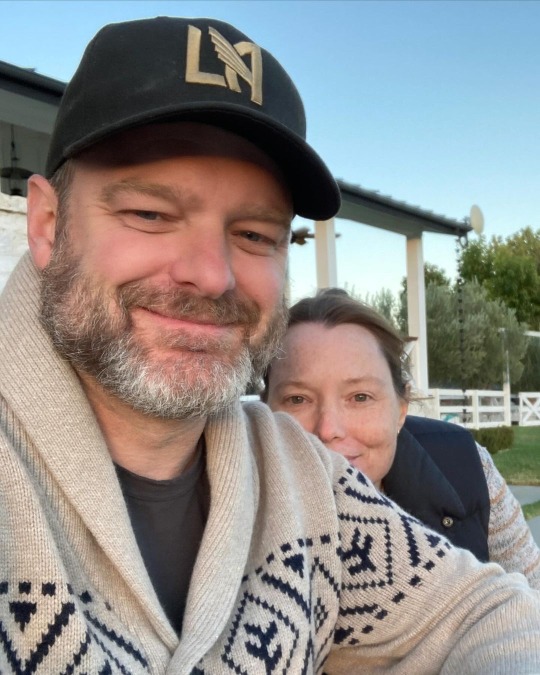


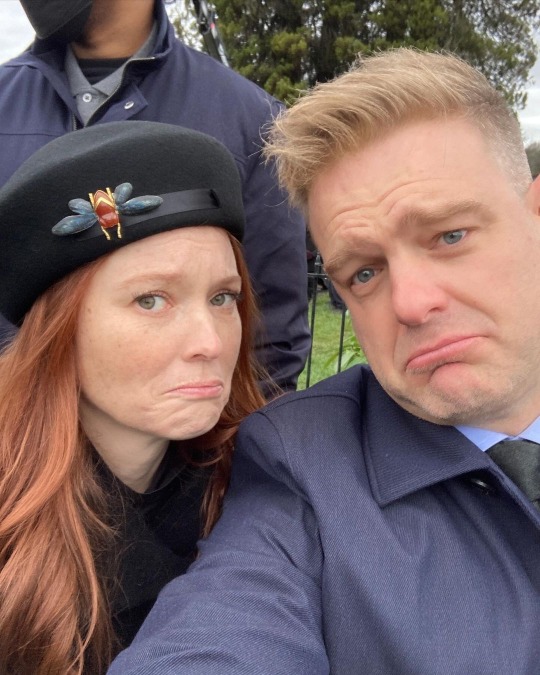



#matt came in with the content I was waiting for#i love when men provide something useful#also her funeral costume was underrated#tfothou#samantha sloyan#matt biedel
37 notes
·
View notes
Text



NOBODY FUCKING GETS IT
#look at my boy 😭#providing for the family (he made frieren clean a entire town’s pots for money)#frieren#sein#sousou no frieren#frieren at the funeral#frieren beyond journey's end#frieren sein#stark#fern#frieren stark#frieren fern
44 notes
·
View notes
Text
.
#funeral’s tomorrow#im dreading it#im not sure i can take it#but im hoping it’ll at least provide some closure
4 notes
·
View notes
Text
people will say "cats will eat you after you die" as if thats a bad thing. i mean, feeding a hungry cat seems like a nice thing really
by the way, dogs will do this too. it is not an expression of heartlessness, it is merely animal hunger
anyways at least the body would serve a purpose rather than being sealed in a box in the ground
#yes i still believe in respecting dead bodies#my mum was made to look pretty for being put in a casket#i picked out her make-up. they brushed her hair. the church provided pretty white clothes#all for the sake of our odd human psychology#it would feel... wrong otherwise#i think my logic is... yes my mum isn't within that meat anymore. but she spent her whole life in it#so it's respectful for make it presentable#it wasn't even an open casket funeral - that would have cost 500 dollars extra for some fucking reason#anyways. if for nothing else: mum valued her appearance and it had made her sad that her sickness withered her away#so it felt extra right to give her nice make-up and pretty hair#we left her earrings on too. they were a gift from me anyways#return the silver to the earth. why not. also it's just easier to leave 'em in her ears#the coroner apparently struggled to get her ring off. but he managed and im wearing it now#this all has nothing to do with the post. im just. yeah
7 notes
·
View notes
Text

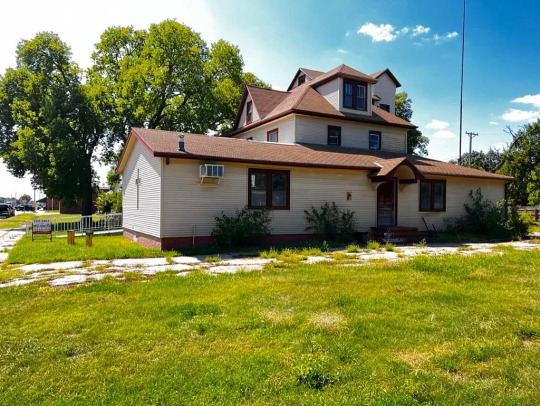
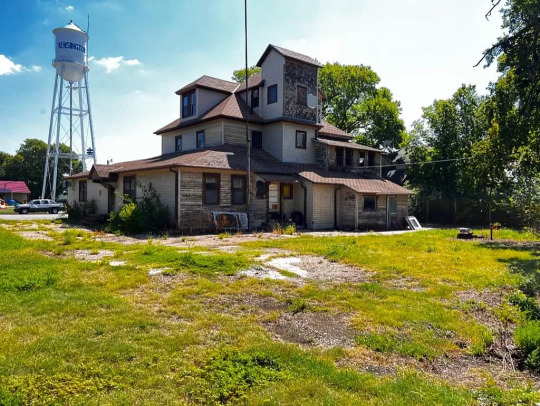
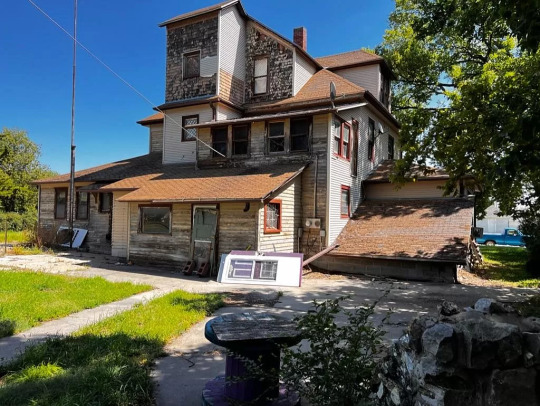

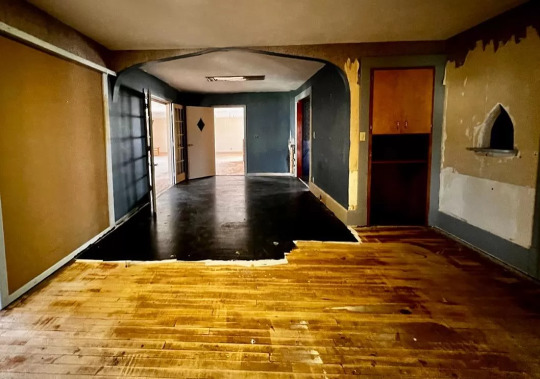

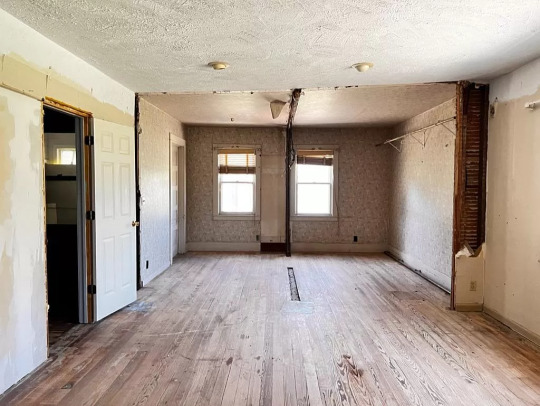
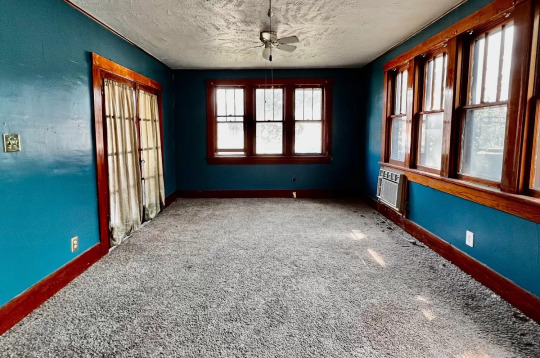
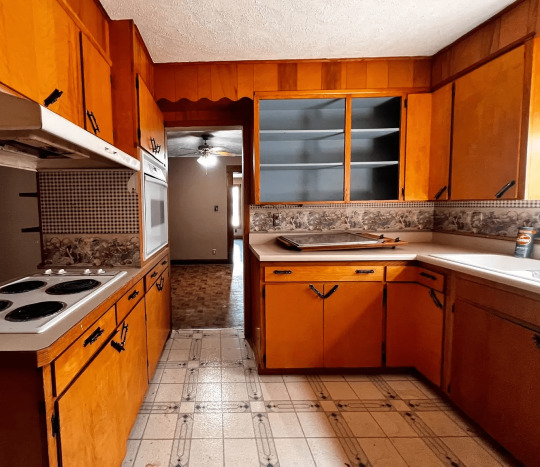
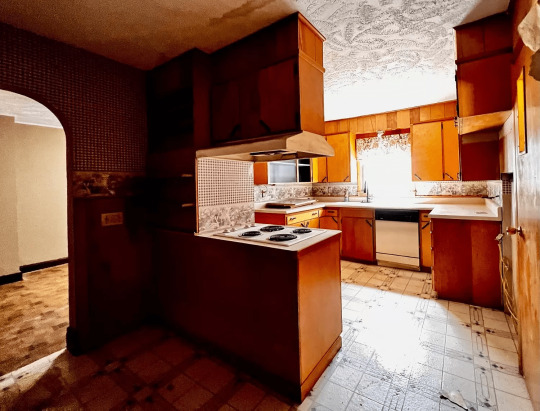
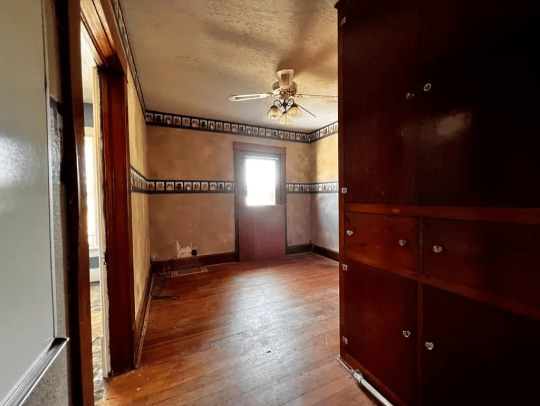
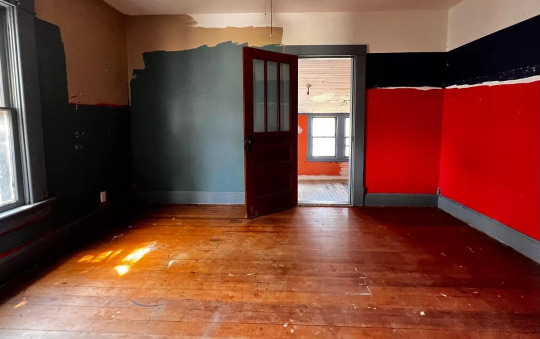
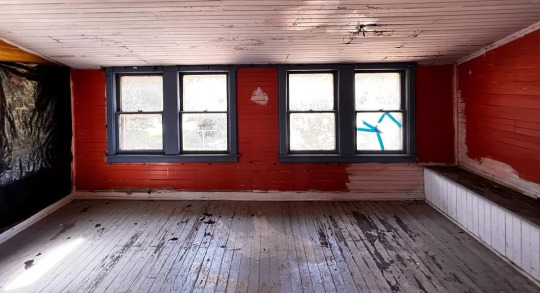
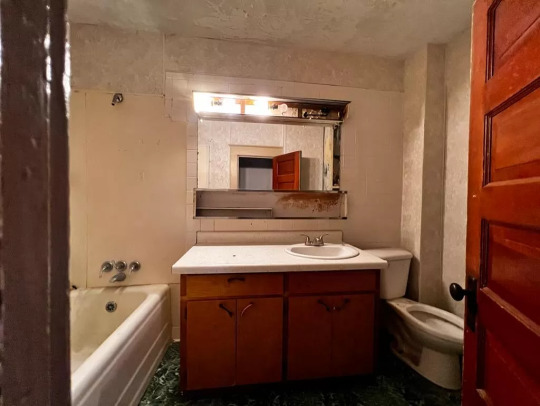
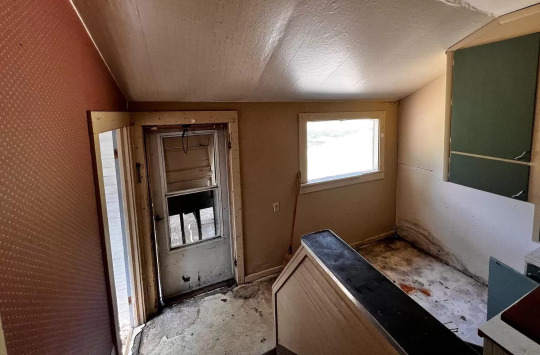
117 North Main St., Kensington, Kansas, USA. Built 1900. Formerly Simmons Funeral Home. The shape of a normal house is buried somewhere in there beneath a bunch of unusual additions.
#buildings#interiors#exteriors#house#funeral home#not sure which one to tag there because its kind of both#hardwood flooring#carpeted flooring#linoleum flooring#wood trim#wallpaper#the pictures provided in the listing are definitely not showing the whole interior#it mentions that theres a basement and attic not shown but i think even with that considered theres stuff omitted#also i have no fucking clue what is going on with the wood flooring being painted black#1900s#1900#Kansas#USA#architecture
16 notes
·
View notes
Text


sable told me this mascot was shinrei. do u guys agree
#ghost's doodles#shinushi#ty kofee for providing jyuush dog ref pics. otherwise i wouldn't have drawn this#THE DOG IS SO CUTE. BUT I GOT HORRIBLE WHIPLASH AT THE LAST 2 WORDS OF THE TWEET#the little bowtie she has.... its literally shin!!#soooo cutie pie! <- mascot of funeral service
42 notes
·
View notes
Text
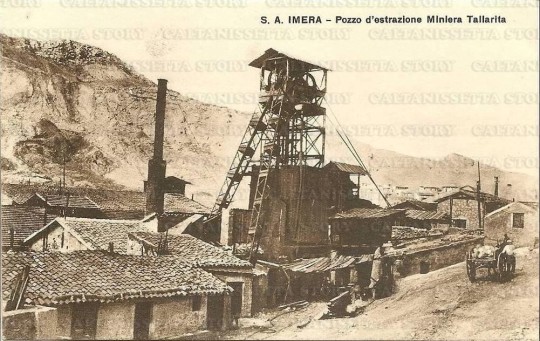
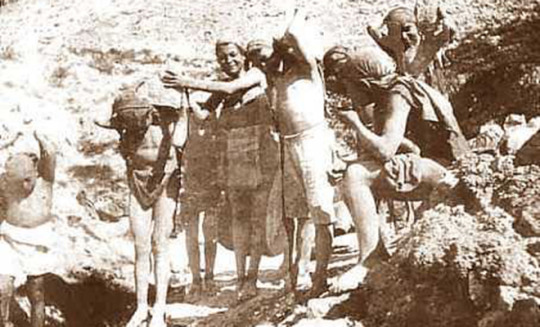
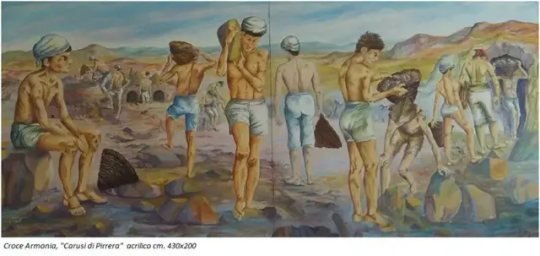
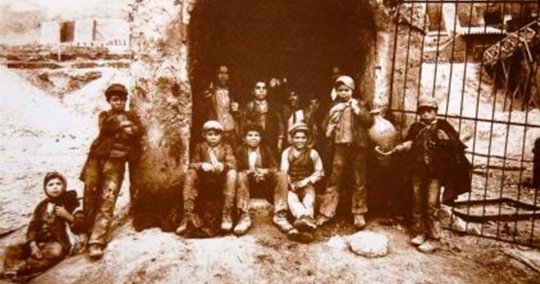
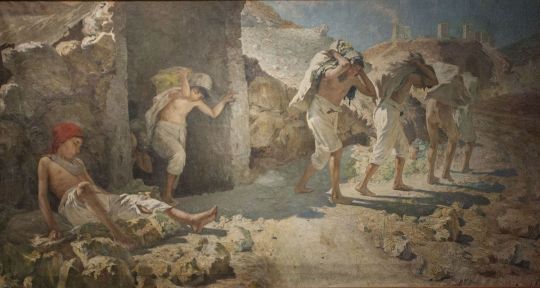
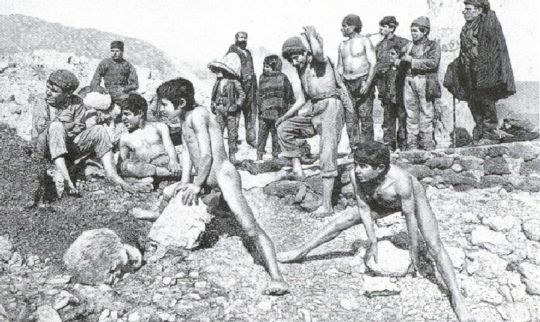
Not only are children, especially boys, employed at a very early age in all the trades I have mentioned, but young boys from fourteen to sixteen perform, as I have said, in the mines and elsewhere an incredible amount of the crude, rough work of the community. I remember, one day in Palermo, seeing, for the first time in my life, boys, who were certainly not more than fourteen years of age, engaged in carrying on their backs earth from a cellar that was being excavated for a building. Men did the work of digging, but the mere drudgery of carrying the earth from the bottom of the excavation to the surface was performed by these boys. It was not simply the fact that mere children were engaged in this heavy work which impressed me. It was the slow, dragging steps, the fixed and unalterable expression of weariness that showed in every line of their bodies. Later I learned to recognize this as the habitual manner and expression of the carusi, which is the name that the Italians give to those boys who are employed in the sulphur mines to carry the crude ore up from the mines where it is dug and to load it into the cars by which it is conveyed to the surface.
The work in a sulphur mine is organized in many respects, I learned, like that of a coal mine. The actual work of digging the sulphur is performed by the miner, who is paid by the amount of crude ore he succeeds in getting out. He, in his turn, has a man or a boy, sometimes two or three of them, to assist him in getting the ore out of the mine to the smelter, where it is melted and refined. As I myself had had some experience as a boy in work similar to this in the mines of West Virginia, I was interested in learning all I could in regard to these boys and the conditions under which they worked.
In the case of boys employed for this work, the Sicilians have a custom of binding out their children to the miner, or picconiero, as he is called. Such a boy is then called, in the language of the country, a caruso. As a matter of fact, a picconiero who buys a boy from his parents to employ him as a caruso actually purchases a slave. The manner in which the purchase is made is as follows : In Sicily, where the masses of the people are so wretchedly poor in everything else, they are nevertheless unusually rich in children, and, as often happens, the family that has the largest number of mouths to fill has the least to put in them. It is from these families that the carusi are recruited. The father who turns his child over to a miner receives in return a sum of money in the form of a loan. The sum usually amounts to from eight to thirty dollars, according to the age of the boy, his strength and general usefulness. With the payment of this sum the child is turned over absolutely to his master. From this slavery there is no hope of freedom, because neither the parents nor the child will ever have sufficient money to repay the original loan. Strange and terrible stories are told about the way in which these boy slaves have been treated by their masters. Before coming to Sicily I had met and talked with persons who described to me the processions of half-naked boys, their bodies bowed under the heavy weight of the loads they carried, groaning and cursing as they made their way up out of the hot and sulphurous holes in the earth, carrying the ore from the mine to the smelter. All that I had heard elsewhere was confirmed later by the details furnished by official reports and special studies of conditions in the mining regions, made at different times and by different persons. In these reports I learned that the mines had been in the past the refuge of a debased and criminal population, whose vices made the bleak, sulphur-smitten region where the mines are located as much like hell as it looks. The cruelties to which the child slaves have been subjected, as related by those who have studied them, are as bad as anything that was ever reported of the cruelties of Negro slavery. These boy slaves were frequently beaten and pinched, in order to wring from their overburdened bodies the last drop of strength they had in them. When beatings did not suffice, it was the custom to singe the calves of their legs with lanterns to put them again on their feet. If they sought to escape from this slavery in flight, they were captured and beaten, sometimes even killed.
As they climbed out of the hot and poisonous atmosphere of the mines their bodies, naked to the waist and dripping with sweat, were chilled by the cold draughts in the corridors leading out of the mines, and this sudden transition was the frequent cause of pneumonia and tuberculosis. In former years children of six and seven years of age were employed at these crushing and terrible tasks. Under the heavy burdens (averaging about forty pounds) they were compelled to carry, they often became deformed, and the number of cases of curvature of the spine and deformations of the bones of the chest reported was very large. More than that, these children were frequently made the victims of the lust and unnatural vices of their masters. It is not surprising, therefore, that they early gained the appearance of gray old men, and that it has become a common saying that a caruso rarely reaches the age of twentyfive.
It was with something of all this in my mind that I set out from Palermo a little before daylight one morning in September to visit the mines at Campofranco, on the southern side of the island, in the neighbourhood of Girgenti.
[…]
The mines at Campofranco are on the slope of the mountain, just above the railway station. A mile or more across the great empty valley, high up on the slope of the opposite mountain, is the village from which the mines get their name, a little cluster of low stone and cement buildings, clinging to the mountainside as if they were in imminent danger of slipping into the valley below. […]
It was at the mouth of one of these entrances to the mines that I got my first definite notion of what sulphur miners look like — those unfortunate creatures who wear out their lives amid the poisonous fumes and the furnace heat of these underground hells. There was a rumble of a car, and presently a man, almost stark naked, stepped out of the dark passageway. He was worn, haggard, and gray, and his skin had a peculiar grayish-white tinge. He spoke in a husky whisper, but I do not know whether that is one of the characteristic effects of the work in the mines or not. I was told that, in addition to other dangers, the sulphur has a bad effect upon the lungs. It was explained to me that the sulphur dust gets into the lungs and clogs them up, and that is what accounts for the groans of the carusi, so frequently spoken of, when they are tugging up the steep and winding passageways with the heavy burdens of crude ore on their backs.
It had been many years since I had been in a mine, but as I entered the dark, damp gallery and felt the sudden underground chill, the memories of my early experiences all came back to me. As we got farther into the mine, however, the air seemed to grow warmer. Suddenly a door at the side of the gallery opened; a blast of hot air, like that from a furnace, burst out into the corridor, and another of those half-naked men, dripping with perspiration, stepped out.
We passed at intervals along the main corridor a number of these doors which, as I discovered, led down into parts of the mine where the men were at work. It seemed incredible to me that any one could live and work in such heat, but I had come there to see what a sulphur mine was like, so I determined to try the experiment.
The side passage which I entered was, in fact, little more than a burrow, twisting and winding its way, but going constantly deeper and deeper into the dark depths of the earth. I had known what it was to work deep down under the earth, but I never before so thoroughly realized what it meant to be in the bowels of the earth as I did while I was groping my way through the dark and winding passages of this sulphur mine.
It is down at the bottom of these holes, and in this steaming atmosphere, that the miners work. They loosen the ore from the walls of the seams in which it is found, and then it is carried up out of these holes in sacks by the carusi.
In the mine which I visited the work of getting the ore to the surface was performed in a modern and comparatively humane way.
It was simply necessary to carry the ore from the different points where it is mined to the car, by which it is then transported to the smelter. In those mines, however, where the work is still carried on in the old, traditional fashion, which has been in vogue as far back as any one can remember, all the ore is carried on the backs of boys. In cases where the mine descended to the depth of two, three, or four hundred feet, the task of carrying these loads of ore to the surface is simply heartbreaking. I can well understand that persons who have seen conditions at the worst should speak of the children who have been condemned to this slavery as the most unhappy creatures on earth. From all that I can learn, however, the conditions have changed for the better in recent years. In 1902 a law was passed which forbade the employment of children under thirteen years in underground work, and to this was added, a little later, a provision which forbade, after 1905, the employment of children under fifteen in the mines.
So far as I am able to say, this provision was carried out in the mine I visited, for I did not see children at work anywhere inside the mine. I saw a number of the poor little creatures at work in the dumps outside the mine, however. They were carrying refuse ore in bags on their backs, throwing it on screens, and then loading the finer particles back into the cars. Once having seen these gangs of boys at work, I could never mistake their slow, dragging movements and the expression of dull despair upon their faces.
It is said that the employment of boys in the sulphur mines is decreasing. According to law, the employment of children under fifteen years of age has been forbidden since 1905. As is well known, however, in Italy as in America, it is much easier to make laws than to enforce them. This is especially true in Sicily. The only figures which I have been able to obtain upon the subject show that from 1880 to 1898 there was an enormous increase in the number of children employed in and about the mines. In 1880 there were 2,419 children under fifteen years working there, among whom were eight girls. Of this number 88 were seven and 163 were eight years of age, while 12 per cent, of the whole number were under nine years of age. In 1898, however, the number of children under fifteen years of age was 7,032, of whom 5,232 were at work inside the mines. At this time the Government had already attempted to put some restrictions on the employment of children in the mines, but the age limit had not been fixed as high as fifteen years.
The sulphur mines are located on the southern slopes of the mountains that cross Sicily from east to west. About ten miles below Campofranco the two branches of the railway, one running directly south from Roccapalumba, and the other running southwest from Caltanisetta, come together a few miles above Girgenti. On the slopes of the broad valleys through which these two branches of the railway run are located nearly all the sulphur mines in Sicily. From these mines, which furnish something like 70 per cent, of the world's supply of sulphur, a constant stream of this yellow ore flows down to the sea at the port of Girgenti.
After leaving Campofranco I travelled through this whole region. In many places the mountain slopes are fairly honeycombed with holes where the miners in years past have dug their way into the mountain in search of the precious yellow mineral. For many miles in every direction the vegetation has been blasted by the poisonous smoke and vapours from the smelters, and the whole country has a blotched and scrofulous appearance which is depressing to look upon, particularly when one considers the amount of misery and the number of human lives it has cost to create this condition. ' I have never in my life seen any place that seemed to come so near meeting the description of the "abomination of desolation" referred to in the Bible. There is even a certain grandeur in the desolation of this country which looks as if the curse of God rested upon it I am not prepared just now to say to what extent I believe in a physical hell in the next world, but a sulphur mine in Sicily is about the nearest thing to hell that lexpect to see in this life. As I have already said, however, there are indications that in the sulphur mines, as elsewhere in Sicily, the situation of the man farthest down is improving. I pray God that it is so, for I could not picture an existence more miserable than the slow torture of this crushing labour in the hot and poisonous air of these sulphur mines.
Let me say also that I came away from the sulphur mines and from Sicily with a very much better opinion of the people than when I entered. I went to Italy with the notion that the Sicilians were a race of brigands, a sullen and irritable people who were disposed at any moment to be swept off their feet by violent and murderous passions. I came away with the feeling that, whatever might be the faults of the masses of the people, they were, at the very least, more sinned against than sinning, and that they deserve the sympathy rather than the condemnation of the world.
The truth is that, as far as my personal experience goes, I was never treated more kindly in my whole life than I was the day when, coming as a stranger, without an introduction of any kind, I ventured to visit the region which has the reputation of being the most wicked, and is certainly the most unfortunate, in Europe. I mean the region around and north of Girgenti, which is the seat at once of the sulphur mines and the Mafia.
If any one had told me before I went to Sicily that I would be willing to intrust my life to Sicilians away down in the darkness of a sulphur mine, I should have believed that such a person had lost his mind. I had read and heard so much of murders of the Mafia in Sicily, that for a long time I had had a horror of the name of Sicilians; but when I came in contact with them, before I knew it, I found myself trusting them absolutely to such an extent that I willingly followed them into the bowels of the earth; into a hot, narrow, dark sulphur mine where, without a moment's warning, they might have demanded my life or held me, if they cared to, for a ransom. Nothing of this kind occurred; on the other hand, I repeat, every Sicilian with whom I came in contact in the sulphur mine treated me in the most kindly manner, and I came away from their country having the highest respect for them.
I did not meet, while I was there, a single person, from the superintendent to the lowest labourer at the mines, who did not seem, not only willing, but even anxious, to assist me to see and learn everything I wanted to know. What is more, Campofranco was the only place in Europe where I met men who refused to accept money for a service rendered me.
Washington Booker T., The man farthest down; a record of observation and study in Europe (1912), p. 200-216
#history#social history#labor history#sicily#people of sicily#campofranco#province of caltanissetta#carusi#tw: child exploitation#tw: child abuse#church refused dead miners the last rites and a religious funeral#since they 'chose' such a debased and infernal job they didn't deserve to be properly buried#this lasted until the 50s#my hometown was close to one of the major (now abandoned) mines and many of my old fellow countrymen were miners#my uncle's late grandfather was a miner and told his grandson this story#after a disaster which caused the death of many miners their coworkes literally forced the coffins inside the church#which wasn't easy considering the fact the church's door was protected by a fence to you know deter 'unwanted situations'#but they succeeded thankfully#imagine being so poor you are forced to accept this basically deadly job to provide for your family#but then you die and some f*ckers thinks you had it coming and refuse you and your family religious consolation
2 notes
·
View notes
Text
it's so funny that the sextuplets die and go to hell in s2 season finale hahaha... anyways, i've been thinking a lot of how mortality is a underlying theme with kuroba's character and how they're constantly forced to think about it with the work that they do and the losses they've experienced themself.
#this started off as thinking about kuroba being there for karamatsu when matsuzou gets hospitalized#because they experienced a similar scare with their grandfather which lead to them taking over the family business#not to mention the loss of their grandmother the year before that#so i think they'd try to give him some advice about how to deal with the prospect of losing a loved one and coming to terms with it#they'd probably tell him that death's an inevitability so that's why you need to make the most of the time you have with the people you lov#yeah imagine saying that to someone only for them to wind up fucking dead not long after#kuroba would not be okay. to say the least#one of the services they provide is funeral arrangements so they probably did the ones for the sextuplets free of charge.....#ngl after i get through my s2 rewatch i kinda wanna try writing a fic about this#idk we'll see i don't usually write fics so i'm not sure if it'll go well 😭#these have been my background thoughts while working on art for the au asks....#well back to the grind boys#oc : kuroba#mj rambles#tw death mention
3 notes
·
View notes
Text
Had some wine feeling good made a really shitty bowl in ceramics class this morning that I’m really worried has a bunch of air holes in it and had a really crappy therapy session where I didn’t talk too much but was honest about some other stuff which is good overall I guess but now I’m doing drunk crochet and watching the Duggar family documentary and probably going to stop watching soon once they start talking about the awful stuff but yeah day in the life of a woman doing her best I guess
#like both sides of my family are either Irish catholic. converted assimilation catholic. or part Jewish but raised catholic.#but my mom read the Boston glob report so I wasn’t baptized or anything and despite her born again phase I’ve never really been religious#so the thought of growing up in that environment is like I can’t imagine the pressure oh my god#like I’ve had Mormon friends and have some friends who were raised homeschool Christian married young and all and like#i don’t know it’s just wild how different our lives are like I’ve got a problems and def inherited the guilt complex thing for sure but like#I also never got told to submit to anyone or that god was watching#or to be modest or any of the purity stuff beyond normal patriarchy stuff#like I’m not saying my life is better but I didn’t do church after age 5 and only go to funeral masses so I like the comfort of like#doing sign of cross and saying Hail Mary and all bc it provides structure for grief but beyond that I can’t imagine living with all of that#these are very long tags with no real point beyond wow. that’s literally bananas to me. but did I mention I’m a little drunk#and even then my family isn’t like hardcore catholic. my grandma and her siblings skipped church to get donuts bc no farm work on Sunday#and my dad grew up like doing fasted mass and everything but heard the 2000s Harvey milk speech and realized gay ppl are okay#and then rest of extended dads side is like catholic but vote blue and think human rights are good and all#my mom has a student who’s like very traditional catholic like she was trying to teach him math and whatever#and the live coverage of waiting for pope confirmation was on tv the whole time#and he fights with her about evolution and learning about the existence of other religions and everything#so I guess even in my own family like. everyone’s down with basic science and civil liberties which is even weirder for me I guess#like not even among fundamentalists like just regular Catholics I’ve had a pretty liberal upbringing re faith. it’s just wild to me#to see the differences of worldview#and even non religion stuff was pretty liberal overall despite living in pretty red area. idk it’s just wild how different life can be
9 notes
·
View notes
Text
Cromwell, rather in keeping with his elusive nature, was absent from his own state funeral.
Paul Lay, Providence Lost
2 notes
·
View notes
Text
.
#I'm so tired today and I have a funeral of Thomas's grandpa all day and it goes without saying I'm here for him + his family - but I still;#don't know how to feel about it. I guess I'll just let the day overcome me for now and provide whatever I can#personal
4 notes
·
View notes
Text
starter call. / accepting.
tales of dax and the former host's excursions with the klingons have been burned into the major's mind. it feels as if decades have passed since the naive, almost tenderhearted jadzia came to her seeking what felt like guidance. now, deep into this war those hands once clean of blood is, too, stained by the perished lives of many.
typically, sisko would be overseeing this occasion — his care towards dax is plain as day. yet, here she stands greeting the now widow of kang.
❝ @daharmasters , welcome aboard deep space 9. ❞
#daharmasters#daharmasters: mara 001.#* 𝐏𝐎𝐒𝐓 : ic#i was thinking the house could provide support / ally temporarily wirh ds9 during the war#or dax died and its the funeral lololol
1 note
·
View note
Text
What Are the Key Considerations When Planning a Funeral?

Planning a funeral is a deeply personal and often overwhelming task. It’s a time to honour a loved one’s life and provide comfort to those who are grieving. With so many details to manage, it’s essential to approach the planning process with care and thoughtfulness.
Here’s a comprehensive guide to the key funerals Brisbane considerations when planning a funeral.
1. Understanding the Deceased’s Wishes
One of the first steps in planning a funeral is understanding and honouring the deceased’s wishes. This can include preferences for burial or cremation, desired religious or cultural practices, and specific details about the service itself. If your loved one left behind a will or any other written directives, review these documents to ensure their wishes are respected.
2. Budgeting for the Funeral
Funeral costs can vary significantly depending on the services and options chosen. It’s important to establish a budget early in the planning process to help guide your decisions. Costs may include funeral home services, transportation, burial or cremation fees, memorial services, and more.
Understanding what’s included in each service and exploring options for financial assistance or pre-paid funeral plans can help manage expenses.
3. Choosing the Right Funeral Home
Selecting a reputable funeral home is crucial. Consider factors such as the services they offer, their location, and their fees. It’s beneficial to visit a few funeral homes, speak with the staff, and compare their offerings. Look for a funeral home that is compassionate, transparent about costs, and able to accommodate the specific needs of your family.
4. Deciding on Burial or Cremation
The decision between burial and cremation is a significant one and often depends on personal, religious, or cultural beliefs. If the deceased had a preference, it’s important to follow their wishes.
If not, discuss the options with family members and consider the associated costs and environmental impact. Both choices have different procedures and legal requirements, so understanding these details will aid in making an informed decision.
5. Planning the Memorial Service
The memorial service is a time for family and friends to gather and pay their respects. Planning the service involves choosing the location, date, and time, as well as determining the type of service (e.g., religious, secular, or themed).
Consider any special requests from the deceased, such as specific readings, music, or speakers. You’ll also need to decide on the order of service and any additional elements, such as slide shows or videos.
6. Arranging for Transportation
Transportation arrangements are a key aspect of funeral planning. This includes transportation for the deceased, family members, and guests. Ensure that the funerals Brisbane home or service provider has adequate arrangements for transporting the body to the place of burial or cremation.
Additionally, consider arranging for transport for out-of-town guests or family members who may need assistance.
7. Selecting a Casket or Urn
If you choose burial, selecting a casket is a significant decision. Caskets come in various materials, designs, and price ranges. If cremation is chosen, you’ll need to select an urn for the ashes. Consider the deceased’s preferences and the family’s wishes when making this choice.
It’s also important to be aware of any legal requirements or restrictions related to caskets and urns.
8. Legal and Administrative Considerations
There are several legal and administrative tasks associated with funeral planning. This may include obtaining a death certificate, securing permits for burial or cremation, and notifying relevant authorities.
Additionally, you may need to address estate matters, such as settling any outstanding debts or distributing the deceased’s assets. Consulting with a legal professional can help ensure that all legal requirements are met.
9. Communicating with Family and Friends
Effective communication with family and friends is crucial during the funeral planning process. Keep everyone informed about the arrangements and encourage them to share their thoughts and preferences. This can help ensure that the service reflects the wishes of the deceased and meets the needs of those who are grieving.
10. Providing Support and Aftercare
Planning a funeral is just one part of the grieving process. It’s important to provide support to family members and friends who are mourning. Consider offering resources such as counselling services, support groups, or bereavement support to help them cope with their loss. Planning for aftercare can make a significant difference in the overall experience for everyone involved.
Final Words
Planning a funeral is a complex and emotional process, but careful consideration of these key factors can help ensure that the arrangements are made with respect and care. By understanding and addressing the deceased’s wishes, managing costs, choosing the right service funerals Brisbane providers, and supporting those who are grieving, you can create a meaningful and memorable tribute to your loved one.
0 notes